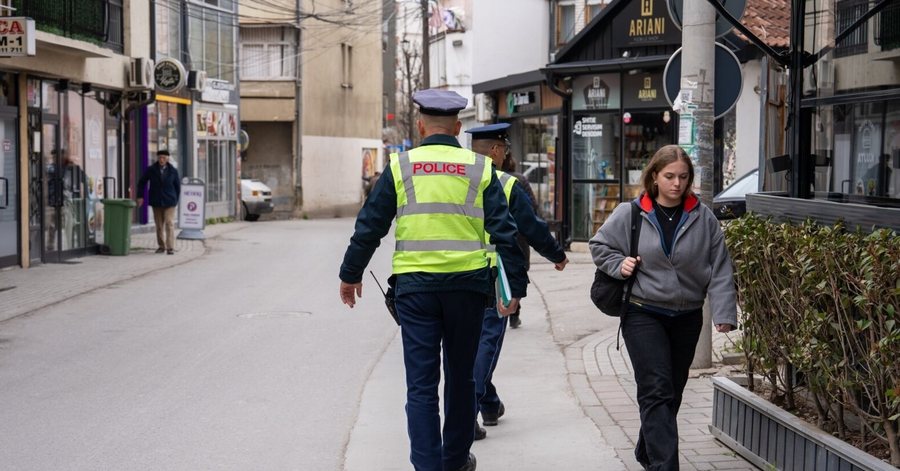
Fear and uncertainty have gripped Vushtrri. The streets seem quieter than usual, as residents speak in hushed tones about the shocking events.
"I didn't expect it like this. I saw the news on the portals and I couldn't believe it," says 19-year-old Alaudin Haradini through tears.
His 42-year-old mother was shot dead on March 24 in the village of Stanoc in the Vushtrri municipality. The suspected perpetrator, 58, then killed himself.
Less than 24 hours earlier, Vushtrri was shaken by another serious event: the murder of a 19-year-old in the city center, reports A2.
In both cases, authorities say they are conducting investigations and collecting evidence, but for Alauddin, the pain is unbearable.
"She worked in a bakery to support us," he tells Radio Free Europe.
With his father and two younger sisters, Alaudin finds himself in a new and unexpected reality. "Killing my mother should be the last resort," he says, not wanting to elaborate.
Less than 15 kilometers from his village, inside the city of Vushtrri, residents heard about this case, still reeling from the murder of the 19-year-old by a suspected peer.
"The whole city is in panic," says Hazir Shabani.
"For these things to happen in the holy month of Ramadan is catastrophic," says this Vushtrri resident.
"The city is very, very gloomy" for his fellow resident, Advie Magjuni.
"Murder here and there. I don't think we're very safe. Children carrying guns? This is a disaster," says the 56-year-old.
She also directs part of the responsibility to state institutions, saying that the police should be more organized and more present, especially on the streets and neighborhoods that are most frequented.
This opinion is also shared by Nexhmedin Hyseni, 65 years old.
"There should be more civilian police, not in uniform," he says, pointing down a city street lined with cafes.
Hyseni says he often sees groups of young people arguing in public or pushing each other.
He says that family education should be such that they maintain self-control and understand that "killing is never an option."
"The parents are to blame," according to Qëndrim Zymberi. "Many of them neglect their children," he says.
Zymberi is the cousin of the murdered 19-year-old and says he feels terrified.
"Every citizen you ask feels this way," he says.
Luljeta Merovci, who works as a teacher at a school in Vushtrri, confirms this.
"We shouldn't wait for something to happen and then open our eyes. This is uncertainty," she says.
Factors leading to murder
The municipality of Vushtrri, with over 61,000 inhabitants, is located in the northeastern part of Kosovo.
There is no concrete figure on the unemployment rate there, but what is noticeable in the data of the Kosovo Agency of Statistics is that, among the 38 municipalities in the country, Vushtrri is the second - after North Mitrovica - with the largest number of families on social assistance.
In January, 1,080 families from this municipality benefited from the social assistance scheme, unlike other municipalities, where this figure was under 1,000.
For sociologists, the economic and social situation is among several factors that lead to violent reactions such as murder.
Others include social marginalization, collective depression, settling scores, jealousy, post-traumatic stress...
"It is worrying that a climate of violence is being created in the social environments of Kosovo, which, unfortunately, results in victims," says Fredi Kamberi, a lecturer in Sociology at the "Fehmi Agani" University in Gjakova.
"In the social context, a society that tolerates violence, crime, and deviant problems becomes a priori part of these negative phenomena," he tells Radio Free Europe.
Preventing violence, according to the sociologist, is everyone's responsibility - from individuals to institutions.
He recommends that society be more active and notify security agencies of any problems.
"If this trend continues, we will have major consequences and major security problems, which could become a social norm," according to Kamber.
Data provided to Radio Free Europe by the Kosovo Police shows that the number of murders in Kosovo in 2024 was 17, while in 2023 it was 29.
Under the Law on Weapons in Kosovo, any person who is at least 21 years old can request a permit to acquire a weapon.
The applicant must possess psycho-physical skills and pass the theoretical and practical test for the use of the weapon.
Also, there must be credible reasons why there is a need for a weapon, as well as a clean criminal past.
"We need greater awareness about weapons"
For security expert Valdet Hoxha, the number of murders shows that the issue of weapons has become alarming and requires maximum attention from institutions.
He emphasizes the need for a more comprehensive approach, including the Ministry of Education, to raise awareness among young people from an early age about the consequences of weapons.
According to him, punitive policies alone are not enough, but there should also be awareness campaigns and an amnesty for the surrender of illegal weapons.
In the two cases that occurred in Vushtrri, it is still not clear what weapons were used.
But, it is estimated that there are over 230,000 illegal weapons in the hands of Kosovo citizens.
Kosovo Police says that, on an annual basis, they confiscate an average of around 1,500 weapons of various types without permits.
“The situation is very complex,” says Hoxha, who, in the past, served as Kosovo’s deputy interior minister.
According to him, "there is no magic formula that can immediately solve this problem," but the seriousness of the institutions in dealing with this issue "must be urgent."
Calls and pledges for stricter measures and tougher laws from Kosovo's institutions are not lacking, especially in moments of crisis, but they often fade over time. (A2 Televizion)











